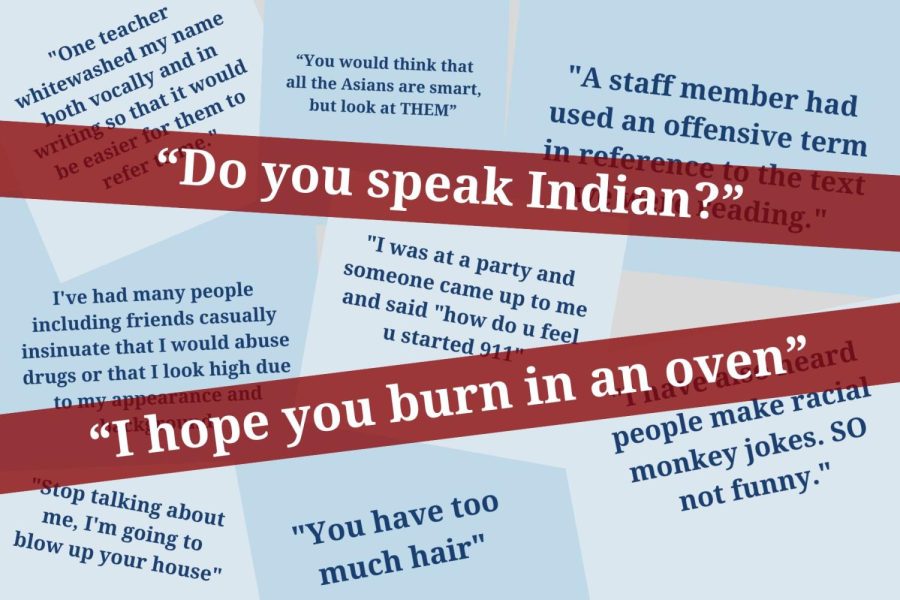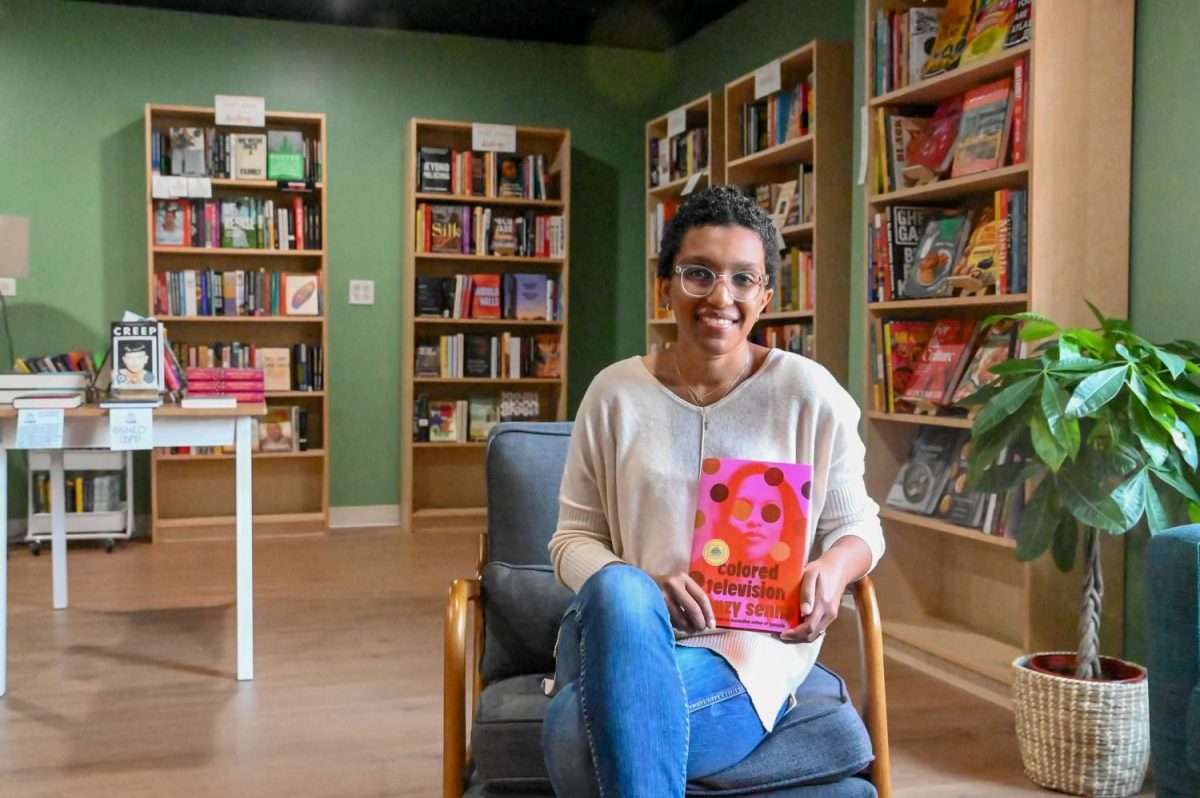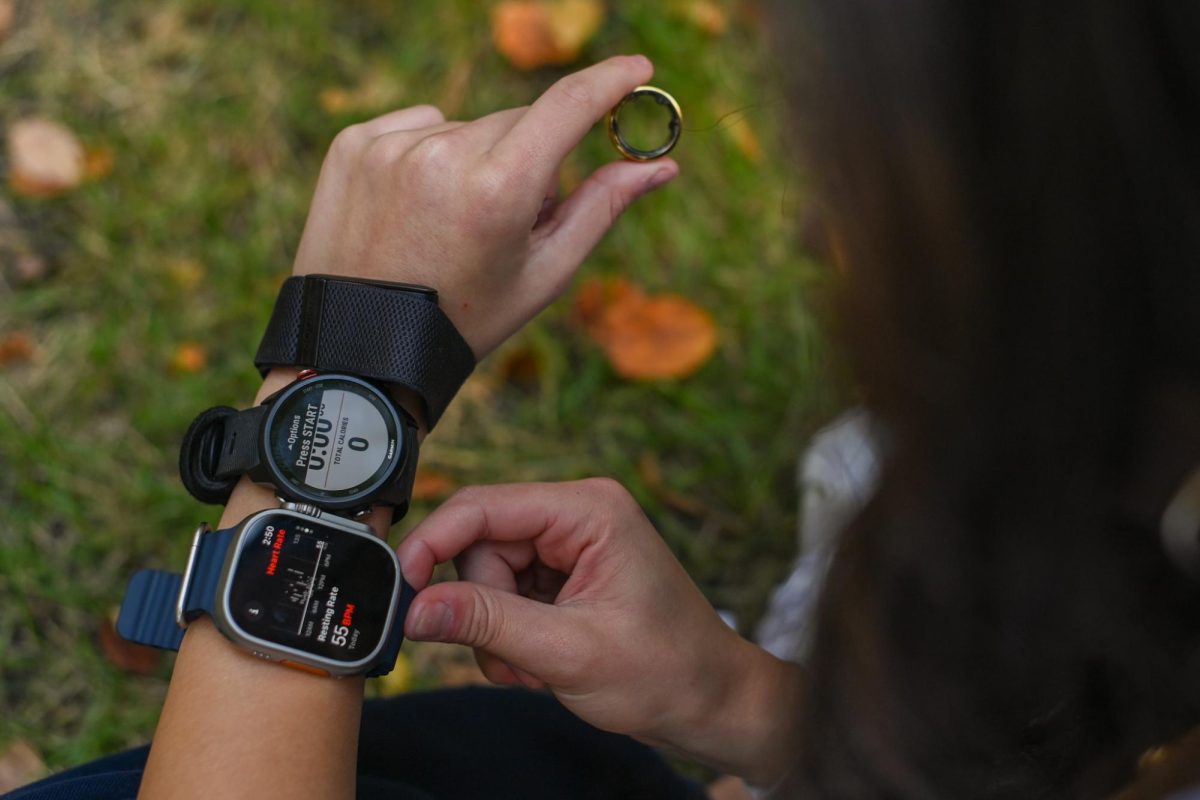With powerful testimonials of discrimination, groups call for action
Following their walkout from the MLK assembly, the Black Students’ Association played audio testimonials in hallways Jan. 17. The testimonials were collected from members of U-High identity groups and detail accounts of overt discrimination and microagressions.
January 24, 2023
Audio testimonials detailing U-High students’ experiences with microaggressions and more severe discrimination at Lab were played through the hallways Jan. 17, just days after the Black Students’ Association led an abrupt walkout of the annual Martin Luther King assembly — actions urging students and administration to address ongoing incidents of discrimination and promote belonging.
“A lot of the time these things heard within the hallway don’t get acknowledged,” BSA co-president Camille Bryant said. “We played them so that people can actually hear them out loud, and they can experience what many students go through every day when they just walk down the hallway.”
By playing the audio testimonials, which were collected before the assembly through identity-based clubs, BSA leaders hope incidents of discrimination will be openly denounced by administration and called out by students.
“We feel like the general social body of the school has this type of secrecy towards things,” co-president Michael Ewing said, “and we feel that we need more open-ended determination of how we dismiss that and how we ease that from our consciousnesses and just have a more opening and welcoming place of mind.”
Laboratory Schools Director Tori Jueds acknowledges Lab has been working on diversity, equity and inclusion objectives, yet progress is still needed. Ms. Jueds said BSA’s call to action provides an opportunity to reevaluate Lab’s Diversity Action Plan.
Nicole Williams, director of DEI, emphasizes the need for adults to acknowledge the impact of discrimination on students’ community experiences.
“Many students here have had experiences of microaggressions and straight-up racism, all kinds of discrimination,” Ms. Williams said. “It’s important for them to keep that front and center for us, adults, to not forget what’s important, which is student experience.”
Harry Bims, a 1981 U-High alumnus who is on the Alumni Association Executive Board and identifies as Black, has seen current students voice the same issues of racial discrimination as previous students vocalized in the past and believes the root cause has not yet been treated.
“I would like to see the administration look at the short-, medium- and long-term ways to address discrimination,” Dr. Bims said. “By doing that, we are working so that Black students feel a sense of ownership at Lab, and we don’t just feel like we are renting time here, but we feel like we are actually a part of the fabric of the school.”
Ms. Jueds and Ms. Williams emphasized continuing professional development, specifically about how teachers support their students. Ms. Jueds is planning a DEI workshop in late spring to highlight the need for allyship.
“I think the work will focus on positive racial identity development for people who identify as white, like myself,” Ms. Jueds said. “I’ve gone through this training before, and it was very impactful for me, and I feel like we’ll benefit by it at Lab.”
Ms. Jueds is also initiating conversations with BSA members, faculty and administration to discuss students’ needs in supporting effective DEI efforts. Additionally, faculty and staff have convened this month to discuss their responsibilities, support for students and actions they can take, Ms. Jueds said in a follow-up email to the Midway.
“There are things that the administration can do, but there’s also things that us as students and teachers, and even parents, can do to help improve the community,” Camille said. “I feel like a lot of people don’t really think, ‘Oh, I’m part of a community, I have to think about how my actions are impacting others.’”
Selected excerpts from an interview with BSA co-presidents Camille Bryant and Michael Ewing are below:
About the MLK assembly theme and organization:
Michael Ewing: “I love that we made the BSA assembly shortened for a multitude of reasons. One of the things that really helped was [for students to be] in that space, with that amount of time, because they could just sit there. They didn’t have a class that they were rushing to right after. They literally had nothing to do because they were expected to sit there for a while already. So they could just sit there and process what they were feeling and then go about their day when they were ready to leave.”
Camille Bryant: “We felt as though the MLK assembly idea itself exhausted the amount of ideas or things that we could talk about. We felt like we started repeating what we wanted to say and we felt like we wanted to be a lot more personal and be intentional with what we put out there.”
About administration response to MLK Assembly:
Michael Ewing: “I appreciate the administration’s [Jan. 13 community email] because obviously it shows how important this assembly was and how it impacted a lot of people. But also, it felt like, once again, we were the ones taking the first step and they were playing catch up, instead of them outwardly just saying it off their own accord.”
Camille Bryant: “The time and effort that [the administration] put into sending out an email about our assembly should be done for other situations once it’s brought to their attention. I’m like, ‘I appreciate that you put time and effort into it. But where was this energy the first time when these situations we’re talking about actually happened?’”
About responses to incidents of discrimination:
Michael Ewing: “When something happens, the response is ‘Let’s take that into ourselves and let’s quickly heal from that and then move past it and move on with our lives.’ They don’t give enough time for individuals to process that fully. Healing will happen eventually, and we all need to take that step eventually, but we first need to actually see what [incidents of discrimination] have done in the community. We need to see the shock from that and we need to see the aftermath. Instead of just healing right away, we need to be able to process that and be able to respond to that in our own time, without instantly apologizing for the person and moving with our lives like nothing has happened at all.”
Camille Bryant: “A lot of the time we’ve seen us with the administration, or you see us with even our teachers and even our friends, they don’t really give you the time to actually process your emotions. They’re like ‘Oh, I’m so sorry this happened.’ And then they assume you’re OK afterwards unless you really demonstrate that you’re hurt. If you don’t shed tears, they automatically think that you’re fine or if you aren’t actively saying something about it, you must be fine.”
“Some people say, ‘Oh, this is normal for this person to say this,’ which excuses that behavior. Just because it’s normal doesn’t mean it’s OK. People should hold others accountable and make sure that what’s being said or things that are being done are not swept under the rug or forgotten. Those are two really individual things that you can do, but also, what behavior or what things like jokes do you make as an individual that are harmful? A lot of times people are like, ‘Oh, this is just humor. This is just me trying to be funny.’ But a lot of times, they don’t really think about ‘Oh, the things I’m saying are actively hurting someone.’ So if you don’t want to publicly be calling out others, you can also internally think about ‘What things do I say and what actions do I exhibit on a daily basis that could be hurting other people?’”
“I feel like a lot of the time, they rely on students of color, especially Black students, to call people out. They are like, ‘Oh, I heard someone say this in the hallway. This is wrong.’ And then they tell us that and we respond with ‘Yeah, it’s wrong. Okay, what do you want me to do about it? You can take steps and you can do something. I don’t know why you want to come to me and seek validation.’ I feel like the Lab culture is very much trying to validate other people’s wokeness, if that makes sense. Instead of actually acting on it, and asking ‘How can I take steps and actions to combat that? How can I minimize the things that contribute to the community?’”












